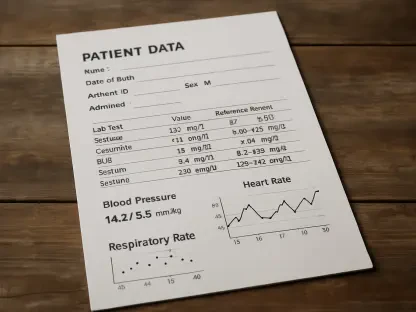The healthcare industry stands at a critical juncture, grappling with systemic challenges that impact millions of lives daily, from long patient wait times averaging over 20 minutes in many facilities to nearly 50% of healthcare workers reporting symptoms of burnout. These alarming figures underscore a pressing need for innovation to alleviate pressure on staff and improve patient experiences. Artificial intelligence (AI) emerges as a potential game-changer, promising to streamline operations and enhance care delivery. This report delves into how AI can transform healthcare while preserving the irreplaceable human connection at its core, setting the stage for a deeper exploration of technology’s role in addressing these urgent issues.
The Current Landscape of Healthcare and AI’s Emerging Role
Healthcare today faces significant hurdles, from patient frustration over cumbersome digital interfaces to prolonged wait times that delay critical care. Staff burnout compounds these issues, with overworked providers struggling to balance administrative burdens with direct patient interaction. The inefficiencies in the system often lead to diminished trust and satisfaction among those seeking care, creating a cycle of dissatisfaction that affects outcomes.
AI is beginning to carve out a vital role in addressing these challenges, with advancements in machine learning and data analytics paving the way for smarter solutions. Major players like IBM Watson Health and Google Health are driving innovation, developing tools for diagnostics and predictive analytics that aim to reduce errors and improve efficiency. Beyond technology, the integration of AI into healthcare is gaining traction as a means to support overburdened systems without sacrificing the personal touch that defines quality care.
The significance of maintaining human connection cannot be overstated, even as AI adoption grows. Technology must act as an enabler, not a replacement, for the empathy and understanding that patients value in their interactions with providers. Striking this balance is essential to ensure that AI serves as a tool to enhance, rather than diminish, the compassionate foundation of healthcare delivery.
AI’s Potential to Transform Healthcare Delivery
Key Trends and Opportunities with AI Integration
Several trends are shaping the role of AI in healthcare, with automation of repetitive tasks standing out as a primary driver. Scheduling appointments, managing patient records, and processing billing can be streamlined through AI systems, allowing staff to focus on complex, interpersonal aspects of care. This shift not only boosts efficiency but also reduces the mental load on providers, fostering a more engaged workforce.
Personalized patient guidance is another promising area, as AI tools adapt to individual needs by offering tailored recommendations for treatment plans or navigating insurance processes. Emerging technologies like natural language processing enable chatbots to provide real-time assistance, meeting evolving patient expectations for instant, accurate information. These advancements help minimize friction in accessing care, creating smoother experiences for all involved.
Opportunities abound for AI to further refine decision-making tools, equipping providers with data-driven insights at critical moments. By analyzing vast datasets, AI can identify patterns and suggest interventions that might otherwise be overlooked, enhancing clinical outcomes. The potential to bridge gaps in care delivery through such innovations positions AI as a cornerstone of modern healthcare transformation.
Impact and Growth Projections for AI in Healthcare
The current impact of AI in healthcare is already measurable, with diagnostic times slashed in many settings due to automated imaging analysis and predictive models. Operational efficiency has seen remarkable gains, exemplified by systems that cut troubleshooting time for digital issues by 85%, freeing staff to prioritize patient needs. Such improvements translate into reduced stress and better resource allocation across facilities.
Looking ahead, projections indicate robust growth in AI adoption, with market analyses estimating a compound annual growth rate of over 30% from this year to 2027. This trajectory suggests potential cost savings in the billions annually, driven by reduced administrative overhead and optimized workflows. The ripple effect promises enhanced experiences for both patients and providers, as time and resources are redirected toward meaningful interactions.
Beyond numbers, AI is poised to play a pivotal role in reshaping care delivery by supporting scalability in underserved areas. Telehealth platforms powered by AI can extend specialist expertise to remote regions, addressing disparities in access. As these technologies mature, their integration will likely become a standard, fundamentally altering how healthcare systems operate and interact with those they serve.
Challenges in Adopting AI for Human-Centric Care
Despite its potential, integrating AI into healthcare is not without obstacles, with fears of job displacement topping the list of concerns. Automation of routine tasks, while efficient, raises questions about the future of certain roles, prompting unease among staff. Addressing this requires a clear narrative that emphasizes AI as a complement to human skills rather than a substitute.
System errors and reliability issues also pose significant barriers, as inaccuracies in AI-driven diagnostics or recommendations can erode confidence in the technology. The risk of diminishing human connection further complicates adoption, as patients may feel alienated by overly mechanized interactions. Balancing technological intervention with personal engagement remains a critical challenge that demands careful consideration.
Solutions lie in thoughtful implementation strategies, such as comprehensive training programs to help staff adapt to evolving roles alongside AI tools. Encouraging collaboration between humans and machines through user-friendly interfaces can mitigate resistance and foster acceptance. By prioritizing education and transparency, healthcare organizations can navigate these hurdles, ensuring that AI enhances rather than undermines the essence of care.
Building Trust Through Ethical AI Practices
The regulatory and ethical landscape for AI in healthcare is evolving, with frameworks like the Core Principles for Trustworthy Health AI gaining prominence. These principles advocate for fairness, transparency, safety, and security, providing a roadmap for responsible development and deployment. Adherence to such guidelines is crucial to prevent bias and protect patient well-being in AI applications.
Compliance with these standards directly influences patient and provider confidence, as trust becomes a cornerstone of successful AI integration. When individuals understand how AI systems operate and feel assured of their safety, adoption rates improve significantly. Transparent communication about data usage and decision-making processes helps build this trust, fostering a positive environment for technology in care settings.
The impact of trust extends beyond immediate acceptance to long-term effectiveness, as skepticism can hinder even the most advanced solutions. Ethical practices must therefore be embedded in every stage of AI implementation, from design to daily use. By prioritizing accountability, healthcare leaders can ensure that AI serves as a reliable partner in enhancing human-centric care delivery.
The Future of Healthcare with AI as a Supportive Guide
Envisioning the future, AI holds the promise of alleviating systemic inefficiencies that have long plagued healthcare, such as fragmented communication and resource shortages. By automating backend processes and providing real-time data, AI can create space for providers to focus on empathy and compassion—elements that technology cannot replicate. This synergy aims to restore balance in a sector often stretched thin.
Emerging innovations, including AI-driven wearable devices for continuous health monitoring, signal a shift toward proactive care models. Potential disruptors like blockchain for secure data sharing could further redefine how information flows within the industry. Global trends, such as aging populations and rising chronic disease rates, underscore the urgency for scalable, AI-supported solutions to meet growing demands.
Preserving human connection amid these advancements remains paramount, as no algorithm can fully capture the nuances of personal interaction. AI must act as a supportive guide, enhancing rather than overshadowing the emotional intelligence that defines healing. As these technologies evolve, their influence will likely shape a healthcare landscape where efficiency and humanity coexist in harmony.
Conclusion: Balancing Technology and Humanity in Healthcare
Reflecting on the insights gathered, it becomes clear that AI holds immense potential to enhance human care by improving efficiency, reducing burnout, and supporting meaningful patient-provider interactions. The exploration of trends, challenges, and ethical considerations paints a comprehensive picture of a technology poised to transform healthcare while demanding careful stewardship.
Moving forward, actionable steps emerge as essential for harnessing AI’s benefits without losing sight of humanity. Healthcare leaders are urged to invest in training initiatives that empower staff to collaborate with AI, ensuring roles evolve rather than diminish. Prioritizing ethical frameworks and transparent communication stands out as non-negotiable to sustain trust among all stakeholders.
The path ahead calls for a commitment to human-centric AI solutions, with a focus on continuous evaluation to address unforeseen challenges. By fostering partnerships between technology developers and care providers, the industry can innovate responsibly. This balanced approach promises to elevate healthcare delivery, ensuring that technology amplifies the compassion at its heart.









